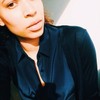From the left to the right: Christina Long in an Opening Ceremony dress, Hood By Air sunglasses, and Ouch boots; Sherrell Dorsey in an Opening Ceremony dress, Ya Jun Lin bomber, and Zara boots; Mona Marie in a Zana Bayne leather top, Opening Ceremony coat and leather pants, and Adam Selman sunglasses; Ashley Baccus-Clark in LOROD denim pants and jacket, Zana Bayne leather harness, Timberland boots, and Andy Wolf sunglasses; Joeanna Bellorado-Samuels in an Opening Ceremony jumpsuit, Tome Jacket, and Helmut Lang boots. Q7 SUVs and R8 supercar by Audi.
Sherrell Dorsey and Mona Marie
Mona Marie and Ashley Baccus-Clark
Sherrell Dorsey and Mona Marie
Ashley Baccus-Clark, Joeonna Bellorado-Samuels, and Christina Long
Stylist: Chasidy Billups
Makeup: Wanthy Rayos
Hair: Illy Lussiano
Nail Artist: Eda Levenson of Lady Fancy NailsThis story is a part of VICE's ongoing effort to highlight the contributions of black women around the globe who are making a difference. To read more stories about strong black women making history today, go here.
Sign up for our newsletter to get the best of VICE delivered to your inbox daily.
